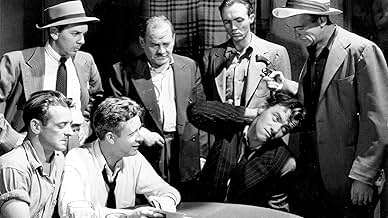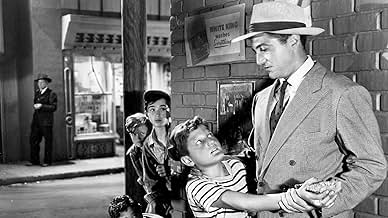Adicionar um enredo no seu idiomaNewlyweds come to visit groom's friend, only to discover him missing; and their investigation uncovers evidence of a ring of anti-semites terrorizing the neighborhood.Newlyweds come to visit groom's friend, only to discover him missing; and their investigation uncovers evidence of a ring of anti-semites terrorizing the neighborhood.Newlyweds come to visit groom's friend, only to discover him missing; and their investigation uncovers evidence of a ring of anti-semites terrorizing the neighborhood.
- Direção
- Roteiristas
- Artistas
Tommy Noonan
- Bob - Barfly
- (as Tom Noonan)
William H. O'Brien
- Funeral Administrator
- (não creditado)
Avaliações em destaque
"Open Secret" certainly owes a debt to "Crossfire," which came out a year earlier, but it stands on its own low-budget merits as not only a solid entry into the small field of 1940s films that dealt openly with racial and religious prejudice, but a very respectable noir thriller. The sets are simple, and there is no location footage at all -- but the director made up for that lack by using a great cast of character actors to portray some very hard-bitten men, women, and children, and, more unusually, he used sound in a dramatic way that continually moves the story forward while keeping the viewer in a state of jangled nervousness. Oh, yeah, its a very cool movie about antisemitism, of course; that goes without saying. But if you want to see it in purely filmic terms and don't care about the "message," it is equally cool. Watch for the fine low-key lighting and strange angle shots -- one of the best set-ups is Sheldon Leonard lounging akilter on a couch in his entry scene with a hugely close-up lamp and telephone in the foreground -- but also LISTEN for the doors opening and closing, telephones ringing, people screaming, sirens, noisy children, mumbling landlady, things dropping, drawers slamming; the sound effects are almost a Hitchcokian element in their own right. And pay attention to the continually changing status of the apartment door -- locked, unlocked, oops she forgot the key, locked, oops she left it open! -- there is a rhythmic and frightening quality to the door's continually shifting security status that is heightened by the always jarring sounds of intrusive door knockings and unexpected telephone rings. Considering what these folks had to work with, i think they succeeded admirably.
This is a creeping thriller of some very unpleasant character, as it gets worse all the time. The newly wed John Ireland visits a friend on his honeymoon, but as he reaches the friend's apartment, the friend is gone and lost, while his apartment is constantly being haunted by guys looking for something. It proves to be pictures, which are far too revealing for the taste of a criminal gang trying to develop into new nazis. The thriller is very well composed, it is logic and realistic all the way, the suspense keeps increasing as the plot thickens without mercy, and finally you'll even get the sensation of seeing John Ireland fighting with his hands pinioned - few actors have done that on the screen. John Ireland seldom got the opportunity to play the lead, he was usually cast as second hand gangsters, but here he actually shows off, and it might be his best picture. The terrific music adds to the atmospheric tension of the film.
... in its exploration of anti-Semitism in a small town.
John Ireland and Jane Randolph play a pair of newlyweds who arrive in an unnamed town and are invited to stay at the apartment of an old service buddy of Ireland's. Only the buddy isn't there (they're told he'll be back by the landlady who lets them into his apartment). But as time passes the friend is a no show and there's a growing feeling that something sinister may have occurred, especially when the couple discover some white supremacist pamphlets hidden in a drawer.
In the early stages, the film hints at the prejudice in the town, with talk about "foreigners" and "staying with their own kind". Later, though, it becomes more blatant, with "a certain word" making no doubt about the object of the hatred. That bigotry insidiously trickles down to the neighborhood kids, too, slashing the tires of a car of a Jewish merchant (George Tyne in a quite effective performance), as well as preparing to throw rocks through his window.
The film has the visual elements of noir with its shadowy photography, appropriate for such a dark subject. The overall effect of the messaging in this film is, unfortunately, rather muted. The performances are adequate but restrained. However Roman Bohnen is appropriately loutish as a drunken bigot who strikes his wife (Ellen Lowe) across the face in a tavern.
And here this little "B" briefly, and tellingly, raises another ugly subject rarely broached in '40s dramas, spousal abuse. That is never more poignantly apparent than in the dialogue Lowe later delivers to Ireland in one powerful scene:
"Tell you what? How for the last five years he hasn't drawn a sober breath? How he beats me to prove that he's better than I am? He's a man. How he throws out the few flowers I pick, says they stink up the house. How he can't keep a job? Always blames it on (others)... never on to himself. How he's broken me. Torn me to pieces. Is that what you want me to tell you?"
Dialogue like that still has a strong impact, in combination with the tired anguish of Ellen Lowe's face and delivery.
John Ireland and Jane Randolph play a pair of newlyweds who arrive in an unnamed town and are invited to stay at the apartment of an old service buddy of Ireland's. Only the buddy isn't there (they're told he'll be back by the landlady who lets them into his apartment). But as time passes the friend is a no show and there's a growing feeling that something sinister may have occurred, especially when the couple discover some white supremacist pamphlets hidden in a drawer.
In the early stages, the film hints at the prejudice in the town, with talk about "foreigners" and "staying with their own kind". Later, though, it becomes more blatant, with "a certain word" making no doubt about the object of the hatred. That bigotry insidiously trickles down to the neighborhood kids, too, slashing the tires of a car of a Jewish merchant (George Tyne in a quite effective performance), as well as preparing to throw rocks through his window.
The film has the visual elements of noir with its shadowy photography, appropriate for such a dark subject. The overall effect of the messaging in this film is, unfortunately, rather muted. The performances are adequate but restrained. However Roman Bohnen is appropriately loutish as a drunken bigot who strikes his wife (Ellen Lowe) across the face in a tavern.
And here this little "B" briefly, and tellingly, raises another ugly subject rarely broached in '40s dramas, spousal abuse. That is never more poignantly apparent than in the dialogue Lowe later delivers to Ireland in one powerful scene:
"Tell you what? How for the last five years he hasn't drawn a sober breath? How he beats me to prove that he's better than I am? He's a man. How he throws out the few flowers I pick, says they stink up the house. How he can't keep a job? Always blames it on (others)... never on to himself. How he's broken me. Torn me to pieces. Is that what you want me to tell you?"
Dialogue like that still has a strong impact, in combination with the tired anguish of Ellen Lowe's face and delivery.
An offbeat thriller,which is also a plea for tolerance and a strong indictment of ordinary anti -Semitism , shortly after WW2 (two of the characters ,including the principal ,are former army pals ; the prologue, which ends with an ominous word (guilty) , the shirt, the booklets John Ireland finds in the drawer ("he may use them to wrap up his rubbish") , and a menace hanging in the air , these criminal people always called "they" , all this makes a fine film noir.
The late 1940s saw a brief spate of message movies dealing with anti-semitism, most notably the fantastic film noir thriller CROSSFIRE and the more famous but somewhat tepid GENTLEMAN'S AGREEMENT (both 1947). OPEN SECRET, from 1948, shares more in common with CROSSFIRE given its noir trappings and thriller elements. John Ireland plays ex-GI Paul Lester who, along with his new wife Nancy (the very alluring Jane Randolph) arrive in town with the hopes of visiting Paul's old army buddy, Ed Stevens. When Ed turns up missing, Paul and Nancy are tossed into the middle of a dark mystery involving a neighborhood hate group whose targets are ethnic immigrant residents and business owners. Chief among them is Harry Strauss (George Tyne) a Jewish camera shop owner who figures prominently in the search for Ed who, it turns out, has been hunted down and killed by the hate-mongers because of incriminating photographs involving a previous killing that were in his possession. The direction (by John Reinhardt) of the film is considerably more lively than most ultra-low budget thrillers and the issues it brings up are actually on the level of those tackled in CROSSFIRE. Much of the dialog is quite intelligent and pungently written, dealing with delicate issues in a frank, straightforward way. Other notably interesting people in the cast are Roman Bohnen (the well-respected left-wing blacklisted actor) as an alcoholic wife-beater and member of the hate group, Sheldon Leonard (a veteran of tons of "B" noirs) as a sympathetic cop and, in a background bit part, King Donovan (from Don Siegel's "Invasion of the Body Snatchers"). OPEN SECRET has recently been released in a budget-priced DVD and I strongly urge fans of this hybrid noir genre to check it out.
Você sabia?
- CuriosidadesThe soundtrack by Herschel Burke Gilbert was reworked in 1952 into a library of music cues for several TV shows including As Aventuras do Super-Homem (1952), Captain Midnight (1954), Sky King (1951), Space Patrol (1950), Ramar das Selvas (1952), and Racket Squad (1950). These appear on the Original Television Soundtrack CD for The Adventures of Superman, issued in 2000 by Varèse Sarabande.
- ConexõesFeatured in John Reinhardt: Direction Without Borders (2022)
Principais escolhas
Faça login para avaliar e ver a lista de recomendações personalizadas
Detalhes
- Data de lançamento
- País de origem
- Idioma
- Também conhecido como
- Secret deschis
- Locações de filme
- Empresa de produção
- Consulte mais créditos da empresa na IMDbPro
- Tempo de duração
- 1 h 8 min(68 min)
- Cor
- Proporção
- 1.37 : 1
Contribua para esta página
Sugerir uma alteração ou adicionar conteúdo ausente















